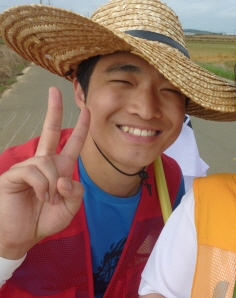Have you ever heard ‘the Long March through National Land (Long March)’ which was opened every year in POSETCH? Hi, I’m Kim Jeong-woo who served as the leader of this year’s event. From its preparation process to my personal feelings, I will introduce the Long March from A to Z. Before writing, I want to express my appreciation to Suh-young who walked with us and gave me a wonderful chance to share our unforgettable experience.
To begin with, the Long March involves walking 30 km foreight hours every day, cooking our own meals, sleeping in a tent, and more walking. One of the Long March’s features is that all people live together all day. Although they were total strangers before, they come to know each other as if like siblings. And then, we find that there is no room for secrets between this family-like group.
When I tell my friends to go to the Long March, there is a stereotypical question that most friends might ask- ‘How come you are asking for trouble?’ Yes, but not entirely true. In fact, the Long March is challenging. During the Long March, it is required of participants to wash for 10 minutes with five other people in a small place such as rest rooms of elementary schools. Despite this, there is an obvious reason why Irecommend the Long March. There is a saying that there is no educator like adversity. At the climax of pain, we found the hidden side of us without any pretenses.
At first glance, the life of Long March is simple and easy; all that is required is walking, eating and sleeping. However, looks can be deceiving. At the Long March, there were lots of obstacles that tempted us to give up. Most of all, thesleeping issue was the most difficult part of the Long March. Every night, we had a war against mosquitos. Although we used up more than half of the repellent, when we heard a high pitched hum in a tent, we had to admit the fact that we were in for another sleepless night. In order to prepare breakfast, every morning we had to draw to see who went first, satisfying his limited free time. Moreover, there were no shower facilities; we connected a hose and washed quickly with many others at the same time. We got extremely sensitive, easily upset and irritated towards selfish, inconsiderate behavior.
Contrary to what it may seem, the Long March was arduous but still joyful. As people walked, they became close to each other with stunning speed. During the Long March, big and small injuries occurred. One or two days later, the quick-and-dirty hospital could no longer accommodate injured participants. There was no room left for even a single person in the typical plastic picnic mat, which we called hospital. Whenever there was a break time, many went to hospital and cured their injury mostly due to joint pain and blisters on feet using the first-aid kit. However, participants began to think positively that they were having an exclusive experience at the Long March. Also, they began to take care of other participants who seemed more injured in order to achieve the common goal- stay the course.
Despite difficulty, there is no doubt that participants were satisfied with the Long March and cannot but recommend to other people who haven’t tried yet. Indeed, the supreme valuable thing of the Long March is meeting people. We meet a lot of people in our campus and in the society. However, who are the people we meet? Do they really know who I am? On the other hand, we literally lived together twenty-four-seven. In a situation where there wasn’t the internet connection and cell phones, the only thing we could do was get to know each other. In order to distract from the harsh situation, and keep walking, we talked and talked from the thoughts of memory. By talking without any pretense, we were able to truly know others, respect them, and build the relationship based on the faith. Without a doubt, these kinds of ties cannot easily break. They are one of the most precious ties which we can form.
As a devotee of the Long March, I am frequently asked-‘Would you like to go to the Long March in the next year?’I would say ‘No,’ Please allow me to give an example to explain my reasoning, using the idea of girlfriends. While I love my girlfriend so much, I don’t need to meet two girlfriends. If I have two girlfriends, I’m supposed to compare them and cannot help deciding which is superior and inferior. In other words, if I have two experiences, it makes me compare them. Therefore, I want to leave this memory for best. Why don’t you try this wonderful experience?

Kim Jeong-woo (IME, '10)


